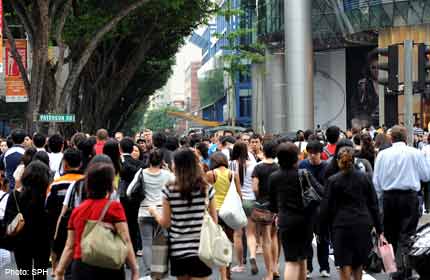
The pace of hiring in Singapore for the first quarter of next year is expected to be slower than this year's, going by an employment outlook survey released yesterday.
Human resource consultancy Manpower Singapore concluded this based on computations of net employment outlook, which is the difference between employers expecting to increase staffing and those expecting to reduce staffing.
It said that this figure is set to fall to 10 per cent in Q1, against 19 per cent in the current quarter and 23 per cent in the third quarter of this year.
The survey sample comprised 654 employers.
The most optimistic net employment outlook was reported in the finance, insurance and real estate sectors, at 22 per cent.
Active labour markets are also forecast in mining and construction and in public administration and education, at 21 per cent each.
The service sector is the weakest among all sectors, clocking 3 per cent.
Manpower Singapore country manager Linda Teo said: "Despite weaker employer hiring sentiment, there are signs of stability in Singapore's labour market."

Some 83 per cent of employers have taken a cautious tack, with no plans to change their staff strength, she noted.
Global management consultancy firm Hay Group also reported a cautious attitude among 505 Singapore- based employers in the area of pay cheques.
Actual average variable bonuses, which are performance- based, will be 2.6 months this year, down from 2.7 last year.
Employers forecast next year's bonus to be 2.5 months.
Victor Chan, Hay Group's regional general manager for productised services in Asean, said: "Employees in developed markets like Singapore face a tough year ahead, with sluggish growth and pay rises slightly outstripping inflation."
The average employee can expect a 4.6 per cent salary increase this year; next year, it is projected to be 4.4 per cent.
High-growth Asian economies like Vietnam will do better, boosting Asia's overall pay increase to 7.5 per cent next year.

